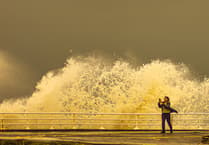“War is always a disaster and this war is no exception”, a Russian expert from Aberystwyth has said as she sheds light on the conflict.
Dr Jennifer Mathers, who grew up in the United States during the Cold War, has been teaching and researching Russian politics and security at Aberystwyth University since 1992.
Dr Mathers spoke about why Russian President Vladimir Putin decided to invade Ukraine now: “Russia’s war in the Donbas had stalled and did not seem able to gain further territory without an intervention on a much larger scale. The need to protect the people of the Donbas region from ‘genocide’ by the Kyiv government is one of Putin’s justifications for the current war – for which there is no evidence.
“The US withdrawal from Afghanistan after more than 20 years might have caused Putin to judge the American President Joe Biden as weak and unlikely to take any action in support of Ukraine.
“Russia has also recently undergone a major period of military reform and an enormous investment of resources into its conventional weapons, so Putin might have considered that he has the military capability necessary to take on a full-scale invasion of Ukraine.
“Finally, Putin has evidently been remarkably isolated from other people during the COVID pandemic, which might have reinforced his own views and concerns about the future direction of Ukraine and what that might mean for Russian security.”
But President Putin’s concerns about the security implications of former Warsaw Pact members “becoming part of ‘the West’ through joining institutions such as the EU and Nato” are “nothing new”.
Dr Mathers pointed to various revolutions in former Soviet states, including the 2014 Maidan Revolution which brought “a new, more European orientated government to power in Ukraine”, which was regarded by President Putin as a “Western-backed plot for regime change”.
Immediately after, Dr Mathers said Russia moved to annex Crimea and provide extensive support for paramilitary groups in the Donbas region.
“Unless we see a regime change in Moscow (that is, unless Putin is removed and replaced with another leader who is willing to change course) or a collapse of the Russian military, chances are we are looking at a lengthy war of attrition, or perhaps a formal ‘victory’ for Russia and nominal control of the country followed by a Western-backed insurgency. This would not be a good result of anyone.”
In terms of President Putin using nuclear weapons, Dr Mathers said: “Putin has recently reminded the world that Russia has nuclear weapons and implied a threat to use them if the West intervenes in this war. It is hard to know whether he really would go that far.
“Most experts on Russia (and I include myself here) did not expect him to go through with a full scale invasion of Ukraine because of the high cost that Russia would pay and the uncertain nature of any ‘victory’, so we just don’t know what to expect.
“If we do manage to get to the end of this war without the use of nuclear weapons, I hope that this experience will give new impetus to the nuclear disarmament movement.”
But Dr Mathers said a Russian attack on the UK or it’s military forces is “extremely unlikely”, with “people in Wales much more likely to be affected by a further increase in the price of heating their homes and running their cars”.
Dr Mathers added: “War is always a disaster and this war is no exception.
“Ukraine is being punished for the political decisions that its society has made and the war is one that horrifies many Russians.”

.png?width=209&height=140&crop=209:145,smart&quality=75)



Comments
This article has no comments yet. Be the first to leave a comment.